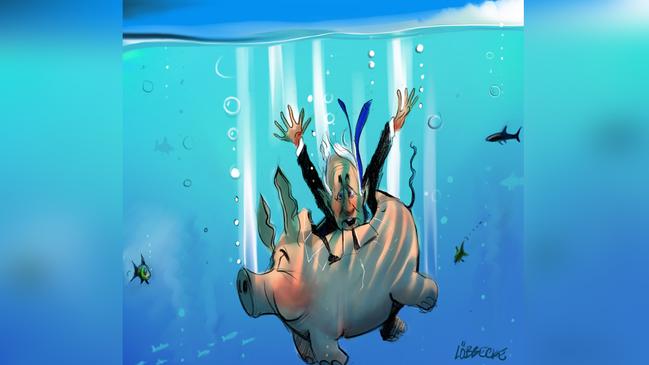Malcolm Turnbull has thrown up his hands as we sink in debt

Smarting over the simultaneous loss of five Super Saturday by-elections, Malcolm Turnbull forlornly restated that his party was the only one that stood for “jobs and growth”. He seemed puzzled that voters couldn’t see that.
Voters were equally puzzled that he couldn’t see why they had lost trust in his leadership and why they believe his approach to governing is more about him than about them.
They are particularly disquieted that after 27 years of uninterrupted growth, their country, which the Howard government left debt-free a mere decade ago, owes more than half a trillion dollars and counting. And they blame government policies for dramatically driving up their living costs and forcing them to borrow over their heads. To them, the much touted growth dividend is illusory.
Our household debt-to-income ratio is the world’s second highest. But government efforts to appease noisy minorities ignore this. It’s as if the global financial crisis never happened. Just as economist John Kenneth Galbraith warned, “Financial disaster is quickly forgotten.”
Australia is not alone. A decade on from the financial crisis, only collective amnesia can explain how a staggering $95 trillion could be added to global borrowings. Today, total debt, including households, stands at about $334 trillion, almost 300 per cent of global GDP. The Bank for International Settlements reports global personal, business and government debt has risen more than 40 per cent since 2008. Central banks have been printing money at their fastest pace since the Weimar Republic. To most, these numbers are just incomprehensible. Japan appears to learn nothing from financial crises. Notwithstanding a rapidly ageing population, soaring welfare costs, a shrinking tax base, negative savings and total debt approaching 400 per cent of GDP, it tolerates a $1.2 trillion budget deficit. The world’s third-largest economy seems in urgent need of miracles.
Facing massive over-investment and a shrinking working-age population, the world’s second-largest economy may also need miracles. According to the Institute of International Finance, between the fourth quarter of 2008 and the first quarter this year, China’s gross national debt exploded from 171 per cent of GDP to more than 300 per cent. More frightening, the People’s Bank of China calculates total bank lending stood at 648 per cent of GDP last year, with off-balance-sheet assets exceeding on-balance-sheet assets. Attempts to crack down on loose bank credit didn’t last long. With the economy underperforming, Beijing issued fresh orders for banks to lend more.
The world’s largest economy provides no consolation. US national debt has reached $28 trillion for the first time. As a share of GDP, it is nearing its wartime record. Household, business and government debt of $36 trillion in 2008 is now $50 trillion, or 250 per cent of GDP. At the same time, America’s personal savings rate has plunged from 11.1 per cent in 2012 to 2.8 per cent. By 2030, one in five Americans will be of retirement age. They face unfunded pension liabilities of $284 trillion and many must worry if there will be enough money to sustain them.
It is difficult to predict when the next crisis will be. Apart from vague warnings, the architects of these Ponzi schemes only whistle happy tunes. Not once in its regular April forecasts has the International Monetary Fund predicted a contraction coming the next year. Indeed, a recent IMF working paper (How Well Do Economists Forecast Recessions?) found that forecasters expected output to fall in only five of the 153 cases studied. That means only 3 per cent of the time has the public and private economic community consensus accurately predicted the coming recession. So why listen to our political leaders when they confidently predict they can return the federal budget to surplus by 2021?
Did they consider the likelihood that the US Federal Reserve would soon be raising interest rates and that 10 of the 13 postwar Fed rate rises ended in recession? Did they entertain the reality that we are deep into the second-longest business expansion on record and that the much hyped, synchronised global expansion is in the past? That China is slowing and, according to surveys, growth in most Asian economies is fading? That EU growth forecasts are being cut and that Germany’s first quarter expansion halved? And, notwithstanding the excitement, America’s latest deficit-funded tax cuts have had a less-than-expected economic impact?
But then, the political imperative is to keep people happy, not prepare them for difficult times. For Australia, the risks of another financial meltdown are much greater than in 2008. Governments have drained the Treasury and gone deeply into debt. The Reserve Bank has limited room to move. Wages are flat and key household budget items like housing, healthcare, education and transport are increasing above the rate of inflation. One quarter of households have less than $1000 in cash savings, indicating many Australians are running on empty. This situation, and the unhealthy concentration of property loans in Australian bank balance sheets, represents a major threat should credit tighten. Australians would do well to heed the fund managers’ perennial warning: past performance is no guarantee of future results. Deficit spending, loose credit and personal savings may drive economic growth for a while, but long term it is unsustainable.
In the meantime, we continue to travel through uncharted waters, putting trust in our leaders’ flawed economics and hoping that somehow this time it will be different. It won’t. No one is bigger than the business cycle, and so we are destined, yet again, to experience another costly failed political experiment, born of interventionist ideology and the fiction of unlimited debt and taxes. As always, we will pay the price.


